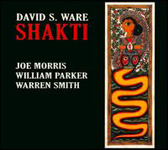Home » Jazz Articles » Album Review » David S. Ware: Shakti
David S. Ware: Shakti
Ware has grouped together more veteran improvisers for his record, including William Parker on bass, Joe Morris on guitar and Warren Smith on drums. The new quartet has been working together for a year and a half. But it seems more like a lifetime, for their communal flow lacks nothing.
The concept of this recording reflects Ware's spiritual belief system, which propels him through his music. The songs are carefully imagined shades of each aspect of Ware's Yogic experience.
Ware hooks the listener immediately with a persistent tunefulness ("Crossing Samsara"), borne eloquently through his tenor. With the distinction of his electric guitar, Morris is in perfect sync with Ware to magnify the theme's brightness. Parker on bass mirrors both the saxophonist and guitarist with a deeper tone, and Smith clicks the cymbal to preserve the theme's bounce. It takes no time for the group to unwind, not only in the pursuit of parallel lines, but also in pursuit of each member's strengths. This process provides the basic structure for all of the pieces on the recording.
The tenor's behavior never shifts. The instrument's color and temperament is identifiably that of Ware: full of phrases and arpeggios, which are blustery in the mid-register, boastful in the split and low tones, and sometimes stringent to the highest-pitched squeal ("Namah"). Morris and Parker tend to echo Ware ("Nataraj") so softly that Ware can speak through his horn without competing. Smith consistently maintains the backdrop, creating an incessant flicker on the cymbals, tapping dryly on or snapping rapidly at the drums with sticks. And the the bass drum comes through to provide contrast with the sound character of the other constituents of the drum set ("Shakti: Durga").
When each member comes to the forefront to solo ("Nataraj"), the music remains intense in developing the transition to the next player's space, if not to the whole group's re-bonding. Morris responsively attends to every detail on his guitar—in fingering ("Antidromic," "Shakti: Kali"), as well as tempo and volume. Parker assiduously employs pizzicatos on the bass' thoroughly resonant strings ("Nataraj"), or uninhibitedly bows ("Namah," "Antidromic") his way around and through Ware's generous horn blowing. In the meantime, Morris plows his own narrower fields. Frequently, these vastly dissimilar string components soften the edge of the music; Ware's intro on the kalimba does the same ("Namah"). Smith plays more percussively than rhythmically, intent on establishing a continuous, though variable, atmosphere.
In the last track, "Shakti: Durga, Devi, Kali," Ware communicates clearly and mindfully how Shakti imbues his spirit in the way the primary musical theme is stated and transformed through a tangent of arpeggios, and a brief exploration of high-pitched phraseology. That he personifies this inexplicable "divine evolutionary force" is a gift to all.
Track Listing
Crossing Samsara; Nataraj; Reflection; Namah; Antidromic; Shakti.
Personnel
David S. Ware
saxophone, tenorDavid S. Ware: tenor saxophone and kalimba (4); Joe Morris: guitar and percussion (4); William Parker: bass; Warren Smith: drums and percussion.
Album information
Title: Shakti | Year Released: 2009 | Record Label: AUM Fidelity
< Previous
Farmers By Nature
Next >
Words Project II
Comments
Tags
For the Love of Jazz
 All About Jazz has been a pillar of jazz since 1995, championing it as an art form and, more importantly, supporting the musicians who create it. Our enduring commitment has made "AAJ" one of the most culturally important websites of its kind, read by hundreds of thousands of fans, musicians and industry figures every month.
All About Jazz has been a pillar of jazz since 1995, championing it as an art form and, more importantly, supporting the musicians who create it. Our enduring commitment has made "AAJ" one of the most culturally important websites of its kind, read by hundreds of thousands of fans, musicians and industry figures every month.



















